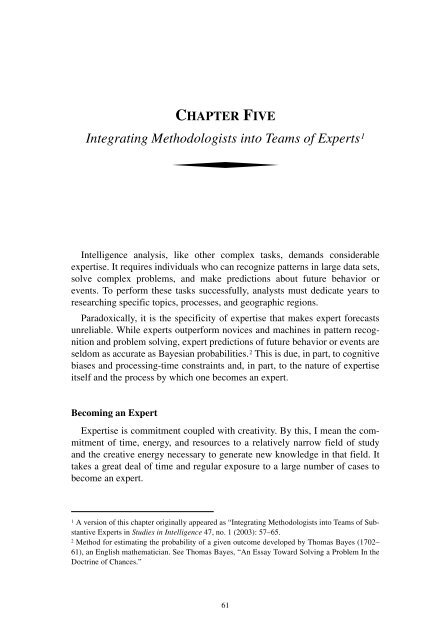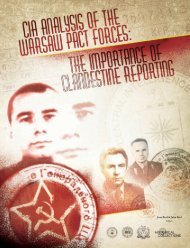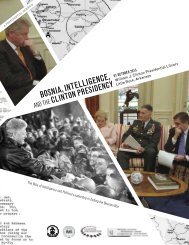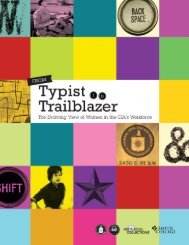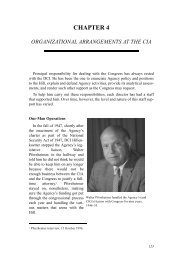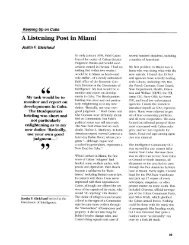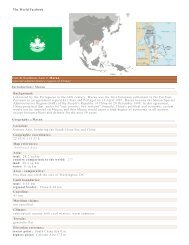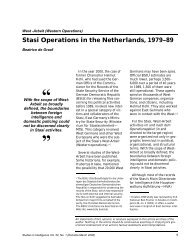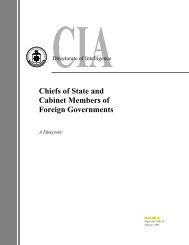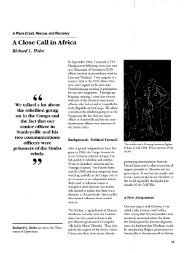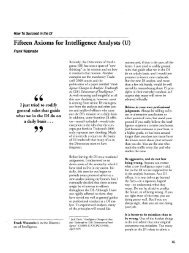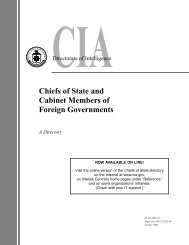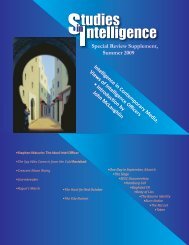Analytic Culture in the U.S. Intelligence Community (PDF) - CIA
Analytic Culture in the U.S. Intelligence Community (PDF) - CIA
Analytic Culture in the U.S. Intelligence Community (PDF) - CIA
You also want an ePaper? Increase the reach of your titles
YUMPU automatically turns print PDFs into web optimized ePapers that Google loves.
CHAPTER FIVE<br />
Integrat<strong>in</strong>g Methodologists <strong>in</strong>to Teams of Experts 1<br />
<strong>Intelligence</strong> analysis, like o<strong>the</strong>r complex tasks, demands considerable<br />
expertise. It requires <strong>in</strong>dividuals who can recognize patterns <strong>in</strong> large data sets,<br />
solve complex problems, and make predictions about future behavior or<br />
events. To perform <strong>the</strong>se tasks successfully, analysts must dedicate years to<br />
research<strong>in</strong>g specific topics, processes, and geographic regions.<br />
Paradoxically, it is <strong>the</strong> specificity of expertise that makes expert forecasts<br />
unreliable. While experts outperform novices and mach<strong>in</strong>es <strong>in</strong> pattern recognition<br />
and problem solv<strong>in</strong>g, expert predictions of future behavior or events are<br />
seldom as accurate as Bayesian probabilities. 2 This is due, <strong>in</strong> part, to cognitive<br />
biases and process<strong>in</strong>g-time constra<strong>in</strong>ts and, <strong>in</strong> part, to <strong>the</strong> nature of expertise<br />
itself and <strong>the</strong> process by which one becomes an expert.<br />
Becom<strong>in</strong>g an Expert<br />
Expertise is commitment coupled with creativity. By this, I mean <strong>the</strong> commitment<br />
of time, energy, and resources to a relatively narrow field of study<br />
and <strong>the</strong> creative energy necessary to generate new knowledge <strong>in</strong> that field. It<br />
takes a great deal of time and regular exposure to a large number of cases to<br />
become an expert.<br />
1<br />
A version of this chapter orig<strong>in</strong>ally appeared as “Integrat<strong>in</strong>g Methodologists <strong>in</strong>to Teams of Substantive<br />
Experts <strong>in</strong> Studies <strong>in</strong> <strong>Intelligence</strong> 47, no. 1 (2003): 57–65.<br />
2<br />
Method for estimat<strong>in</strong>g <strong>the</strong> probability of a given outcome developed by Thomas Bayes (1702–<br />
61), an English ma<strong>the</strong>matician. See Thomas Bayes, “An Essay Toward Solv<strong>in</strong>g a Problem In <strong>the</strong><br />
Doctr<strong>in</strong>e of Chances.”<br />
61


